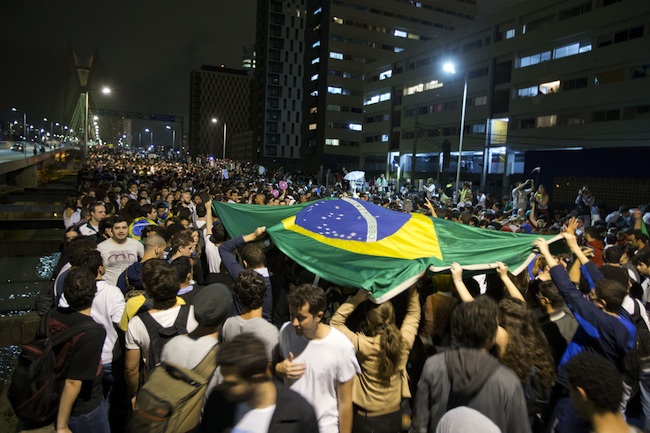SUMMARY
This is AI generated summarization, which may have errors. For context, always refer to the full article.

RIO DE JANEIRO, Brazil – Some 80,000 Brazilians took to the streets again Thursday, June 20, in several cities on a new day of mass nationwide protests, demanding better public services and bemoaning massive spending to stage the World Cup.
More than one million people have pledged via social media networks to march in 80 cities across Brazil, as the two-week-old protest movement — the biggest seen in the South American country in 20 years — showed no sign of abating.
Anger about a hike in public transport fares has spiralled into a wider movement demanding an end to government corruption — one fueled by resentment over the $15 billion cost of staging the Confederations Cup and the World Cup.
In the heart of Salvador, the capital of Bahia state, thousands of protesters — mostly students — massed on Campo Grande square in a carnival atmosphere ahead of a Confederations Cup match pitting Uruguay against Nigeria.
Some created huge banners on big white sheets for the march. Among the slogans were “Come fight for more changes” and “Football above rights: Why, Dilma?”, in a reference to President Dilma Rousseff.
Thousands more flooded the streets of the northeastern city of Recife while in Sao Paulo, Brazil’s business capital and most populous city, crowds began congregating on the main Avenida Paulista.
In Rio de Janeiro, where Nigeria meets Spain in a Confederations Cup clash, 250,000 people said they would join the protest. A huge rally was also scheduled in Brasilia under the slogan “Brazil, Wake Up”.
On Wednesday, the protesters scored a major victory when authorities in Sao Paulo and Rio, Brazil’s two biggest cities, canceled controversial transit fare hikes, but that was not enough to placate the demonstrators.
Funds for education, health
Protesters say they want higher funding for education and health and a cut in salaries of public officials. They are also railing against what they viewed as rampant corruption within the political class.
The demonstrations in the country of 194 million people — the world’s seventh largest economy — have sometimes turned violent.
Late Wednesday, riot police fired tear gas to break up a mob of several hundred that tried to block a 15-kilometer (10-mile) bridge across Guanabara Bay that links Rio with the nearby city of Niteroi.
The mob, which had earlier ransacked a bank branch, knocked over a bus, and then built barricades with debris and set them on fire.
Clashes also erupted Wednesday between protesters and police in the northeastern city of Fortaleza near the stadium where Brazil beat Mexico 2-0 in their second Confederations Cup match, qualifying for the semi-finals.
Social media networks have been key to the organization of the protests, with demonstrators using the slogan “It’s more than just 20 cents” — a reference to the bus fare hikes — to rally people to their cause.
The movement has no political coloration and no clearly identified leadership.
Those opposing the hosting of the World Cup are also planning a mammoth march to Rio’s iconic Maracana stadium on June 30, the day of the final of the Confederations Cup.
Surprise
More than 250,000 people marched in several cities on Monday — a huge turnout that came as a surprise in a country rarely inclined to protest, particularly after a decade of social progress in terms of income and jobs.
“It’s a first step to show that we are not a dead people,” said 24-year-old businessman Bruno Pastan, who stormed the roof of Brasilia’s National Congress with 200 fellow protesters on Monday night.
Security has been bolstered at the Congress building to prevent a repeat of Monday’s disturbances.
“Our concern is to avoid acts of vandalism,” Agencia Brasil quoted Pedro Carvalho, head of the Senate police, as saying.
“We have to respect the demonstrators, but I hope that things will not get out of hand,” said Senate speaker Renan Calheiros.
And Andre Vargas, the acting president of the Chamber of Deputies, announced that measures would be taken to protect public property.
“Demonstrating is a festival of democracy, but it must be peaceful and serene,” he said, warning against any fresh occupation of the building. – Rappler.com
Add a comment
How does this make you feel?
There are no comments yet. Add your comment to start the conversation.